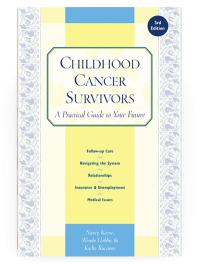Childhood Cancer Survivors
Smoking
Almost half a million people in the United States die each year from tobacco-related illnesses such as cancer of the lung, mouth, neck, esophagus, bladder, and pancreas. 4 Many adult Americans have stopped using cigarettes, pipes, and chewing tobacco because of health warnings on packages, increased awareness of the dangers, and increased cost.
Survivors of childhood cancer shouldn’t smoke because of their risk of cardiac problems, premature emphysema, and lung fibrosis (scar tissue buildup), and, in some cases, increased risk for second cancers. But many survivors do. It’s not surprising that survivors smoke, given that more than a million teens and preteens start smoking every year. Learn about the dangers of smoking at the American Cancer Society’s Tobacco and Cancer website ( www.cancer.org/Healthy/StayAwayfromTobacco/index ).
Survivors who don’t smoke tend to have strong feelings about it.
I had retinoblastoma as an infant a long time ago. I never smoked, although all of my brothers and sisters do. My dad smoked, too, until he died of cardiac arrest.
• • • • •
I have a 15 times higher chance of getting lung cancer because of the mantle radiation I had to treat my Hodgkin’s disease. My doctor specifically asked me about smoking and drinking. I guess I’m an odd character—I’m a Pentecostal. I was raised never to use alcohol or tobacco, so it’s just against my principles. It’s made a lot of things like this very simple—I just don’t do it.
• • • • •
I will never smoke. I don’t like to even be around smoke. Having cancer once is enough. I don’t want to do anything to increase my risks.
• • • • •
I’m an ALL (acute lymphoblastic leukemia) survivor who relapsed three times. I do not smoke and do not like to be around anyone who is smoking. When I was in junior high, it was cool to smoke. I remember the kids dashing across the street during breaks to smoke. I would say, “I’ve already had one type of cancer, why would I want another? You people don’t realize what you’re doing.” My dad is a heavy smoker who smokes two packs a day, and my three brothers and sisters all smoke. I also worry about secondhand smoke. I think if people won’t stop for themselves, they should stop to protect the people around them. I’m very anti-smoking.
Some survivors smoke because they never learned that they have an increased risk for a second cancer, while for others, the cancer treatment was so long ago they don’t consider it in their everyday decisions. Still others have impaired decision-making abilities due to surgery, radiation, or chemotherapy to the brain. Some start to smoke due to peer pressure or advertising, become addicted, and can’t stop.
My teenage son Jeremy is finished with his treatment, but he still doesn’t get the fact that he’s still susceptible to infection, and also at a higher risk for other cancers. Not only does he hang out with kids who smoke, but he smokes, and makes no bones about it. I know it is his way of having control over something. The other night I actually said to him that if he had mets (metastases) to his lungs on his January chest x-ray that he could make the funeral arrangements himself. He got mad at me for yelling at him, but he has started taking his Zyban ® again (anti-smoking medication) and is no longer going outside in the evening to smoke.
• • • • •
I had Wilms tumor when I was a toddler and started smoking cigarettes in college. Because I don’t remember much of my treatment for cancer, I just went on with the rest of my life as if I hadn’t had it. I did stop smoking when I started dating my future husband. He was a nonsmoker and a friend told me that he would think kissing me was like kissing a dirty ashtray. That did it. I stopped.
One component of good follow-up care is education about the effects of tobacco use. Part of the discussion should focus on your increased vulnerability to the cancer-causing aspects of tobacco use. For instance, if you were treated with the drugs bleomycin, carmustine (BCNU), or lomustine (CCNU) and/or had chest radiation, you have an increased risk of lung problems. It is very dangerous to smoke if your lungs might already be damaged from these drugs or radiation. Smoking is also sometimes used as a self-medication for depression. If you think this may be the reason you smoke, get information and help for the underlying depression.
If you don’t smoke, don’t start. If you do smoke, try to stop. By smoking, you may be doing worse things to your body than all of the surgeries, radiation, and chemotherapy you had to treat your cancer. The one thing you can do that will make the biggest difference in your health is to stop smoking. Ask for help from your follow-up clinic or a healthcare provider. You can find motivation and tips about how to stop smoking at www.smokefree.gov . It is very important to remember that no matter how long you have smoked, you can always improve your health by stopping.
Table of Contents
All Guides- 1. Survivorship
- 2. Emotions
- 3. Relationships
- 4. Navigating the System
- 5. Staying Healthy
- 6. Diseases
- 7. Fatigue
- 8. Brain and Nerves
- 9. Hormone-Producing Glands
- 10. Eyes and Ears
- 11. Head and Neck
- 12. Heart and Blood Vessels
- 13. Lungs
- 14. Kidneys, Bladder, and Genitals
- 15. Liver, Stomach, and Intestines
- 16. Immune System
- 17. Muscles and Bones
- 18. Skin, Breasts, and Hair
- 19. Second Cancers
- 20. Homage
- Appendix A. Survivor Sketches
- Appendix B. Resources
- Appendix C. References
- Appendix D. About the Authors
- Appendix E. Childhood Cancer Guides (TM)

